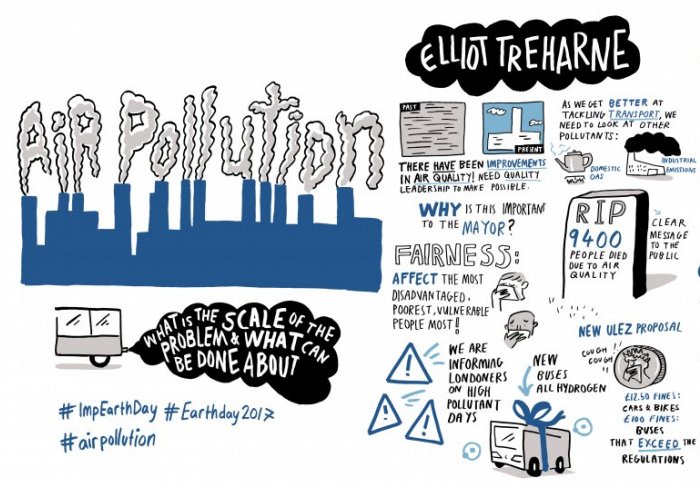

Air pollution is a problem of energy, health and climate change, and has implications for people around the world.
Residents in cities like London breathe some of the dirtiest air in the world. Levels of pollution exceeded European Union recommendations in the first few days of January this year - incurring the threat of heavy fines for the UK.
Air pollution has a serious impact on the environment and people’s health, but the causes are multiple and complex. A new policy briefing from the Grantham Institute identifies some of the key pollutants for global and regional climate change, and aims to set new standards for tools to measure the impact of emissions worldwide.
Grantham Institute – Climate Change and the Environment has joined forces with fellow Global Challenge Institutes at Imperial College London, Energy Futures Lab and Institute of Global Health Innovation, to launch the new paper at a networking event as part of Earth Day, with a keynote speaker on air quality from the Mayor of London’s Office.
The paper’s author, Dr Apostolos Voulgarakis, Lecturer in Global Climate & Environmental Change at Imperial, has examined which pollutants are key in changing climate and weather, and how much emissions from different global regions affect air pollution levels for everyone.
Dr Voulgarakis recommends new standards for comparing the environmental impact of pollutants such as sulfur dioxide, black carbon and tropospheric ozone from fossil fuels used in transport, industry and heating.
The briefing paper also aims to highlight the complexities of tackling pollutants on a global level. For example, sulfate aerosols can cool the atmosphere, which offsets some global warming, but they also degrade air quality and in many regions they are a contributing cause of drought. This means ‘one size fits all’ policies are not appropriate, and tackling health and environment problems caused by emissions requires bespoke solutions at regional level.
At times of political uncertainty [...] policymakers should not be distracted and must act swiftly to improve the health and living conditions for people around the world.
– Dr Apostolos Voulgarakis
Lecturer in Global Climate & Environmental Change
“The world’s attention is focused on the adverse health effects of air pollution from diesel engines, coal burning power stations and gas powered heating. There is now a golden opportunity for new evidence-based policies to tackle air pollution at the same time as meeting obligations to reduce greenhouse gas emissions under the Paris Agreement,” said Dr Voulgarakis.
“At times of political uncertainty, such as in the United Kingdom, European Union and United States, policymakers should not be distracted and must act swiftly to improve the health and living conditions for people around the world.”
The launch event, “Air pollution: what is the scale of the problem and what can be done about it?”, on 21 April 2017, raised awareness of the severity of air pollutant health and environment issues, and showcased Imperial’s world class research designed to tackle the problems by informing decision-makers and shaping policy.
The event was hosted by Professor Nick Jennings, Imperial’s Vice Provost (Research), who oversees the work of the Global Challenge Institutes. He introduced the briefing paper’s author Dr Voulgarakis alongside a panel of other Imperial College London experts including Dr Marc Stettler, Lecturer on Transport and the Environment who discussed the impact of diesel emissions on air quality.
The keynote speaker was Elliot Treharne, Air Quality and Hydrogen Manager at the Mayor of London’s Office. Mr Treharne is responsible for London’s air quality and green transport projects and programmes, and spoke about the role of research in tackling dangerous levels of air pollution in London and beyond.
Other speakers at the event were Professor Peter Burney, Professor of Respiratory Epidemiology & Public Health; and Dr Audrey de Nazelle, Lecturer in Air Pollution Management and head of Imperial's Air Quality Network.
Supporters


Article text (excluding photos or graphics) available under an Attribution-NonCommercial-ShareAlike Creative Commons license.
Photos and graphics subject to third party copyright used with permission or © Imperial College London.
Reporter
Simon Levey
The Grantham Institute for Climate Change

Contact details
Tel: +44 (0)20 7594 5650
Email: s.levey@imperial.ac.uk
Show all stories by this author
Leave a comment
Your comment may be published, displaying your name as you provide it, unless you request otherwise. Your contact details will never be published.




Comments
Comments are loading...